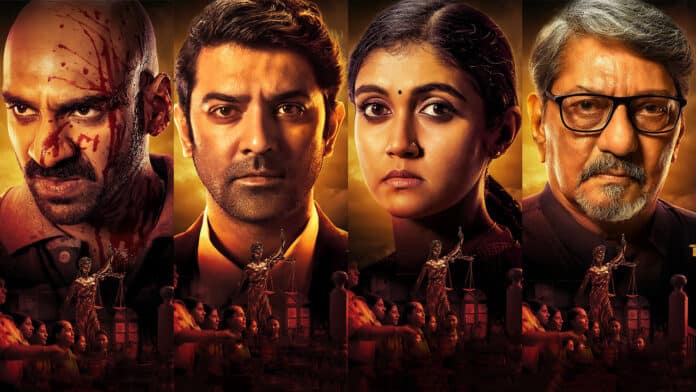Rating: 3/5
Based on a real-life incident, ZEE5’s original movie ‘200 Halla Ho’ explores the horrifying side of class struggle, political backing and the underprivileged lives that suffers amidst it all.
Story
The movie is based on a real-life incident that took place back in 2004. The movie’s plotline opens up with 200 women, faces covered, running out of a courtroom.
Upon searching for the cause, it’s discovered that they have brutally murdered an accused-on-trial, Balli Chaudhary (Sahil Khattar), based on the real-life gangster Akku Yadav who was killed in a similar manner.
Following the high-profile case, the police make a hasty arrest, taking five women in custody on suspicion of Balli’s murder. They are tortured beyond measure to reveal the name of their leader, but they remain mute.
Meanwhile, a Fact Verification Committee is established, headed by a retired celebrated Dalit Judge, Vithhal Daangle (Amol Palekar), who tries to shed light on the events of the courtroom.
However, the people of the Dalit neighbourhood refuse to cooperate, ultimately resulting in the five women being served with lifetime imprisonment.
The police try to make it an open and shut case. Instead of giving up on the fight, the people of the chawl headed by Asha (Rinku Rajguru), her character based on real-life Usha Narayane, appeal to the High Court — this time, the fight deepens as truth spills out.
Are the five women innocent? What was the reason behind the murder of Balli Chaudhary?
Performances
Amol Palekar, in the role of a retired judge, receives much importance in the storyline as the upholder of justice. Even with the central narrative, his character does not have enough growth potential. The tight-knit storyline somehow dims his presence.
Rinku Rajguru has managed to capture the attention ever since her blockbuster movie, ‘Sairat’. With this project, too, she gives power and voice to the character of Asha, who heads the fight against Balli.
Barun Sobti, in the role of a lawyer fighting for underprivileged women, barely has a chance to prove his worth. He, however, through his charm and subtlety, gives whatever he can to his role.
YouTuber Sahil Khattar comes as a good addition to the movie, offering a perfectly villainous approach to his character. His acting definitely makes for a villain we can all detest. The plot, in this case, helps a lot.
The performances are carried out to the best of the actors’ ability with respect to the constricted storyline.
Positives
Directed by Sarthak Dasgupta, the movie does a commendable job of bringing a powerful real narrative to the screen.
The story of Akku Yadav, his murder and the reality behind the case is promptly put forth, both as information and reminders, of people taking power in their hands for a cause when the law fails to protect.
The best thing about the movie is the no-nonsense beginning and the direct dive into the context of the case. The emotions portrayed throughout the story are well-directed and justify the scenario.
Written by Sarthak Dasgupta, Abhijeet Das, and Soumyajit Roy, the plot does not forget the reality it is derived from and manages to showcase the horror and plight of the Dalit women.
The horrifying murder scene in the courtroom and the background score during the climax are well-put out and deserve mention. In addition, the non-linear approach to storytelling does a good job of creating the required impact.
Negatives
The context is over-dramatised — be it the climactic courtroom scene or the torture in the police cell scene. This takes away the rawness of the situation.
The dialogue throughout the movie, especially Amol Palekar, is overtly poetic; he speaks too much in riddles and idioms. On top of that, the compact plot doesn’t allow the characters to flourish or showcase their presence in the narrative.
The subtle love story between Rajguru and Sobti appears to be an unnecessary addition. This hardly has any significance to the plot. It would have been a better choice to focus on the personal growth of the character, especially Asha, instead.
Despite having a women-centric, justice-driven narrative with courtroom drama, it does not come close to that of similar films in the genre like ‘Pink’.
Worth it?
‘200 Halla Ho’ has its ups and downs with overdramatised scenes but presents an authentic story. Owing to the performances and the advantage of learning about the plight of women from the Dalit community, this movie is definitely worth it.
Also Read: Bhuj: The Pride of India review: Incredible event reduced to a tedious affair

